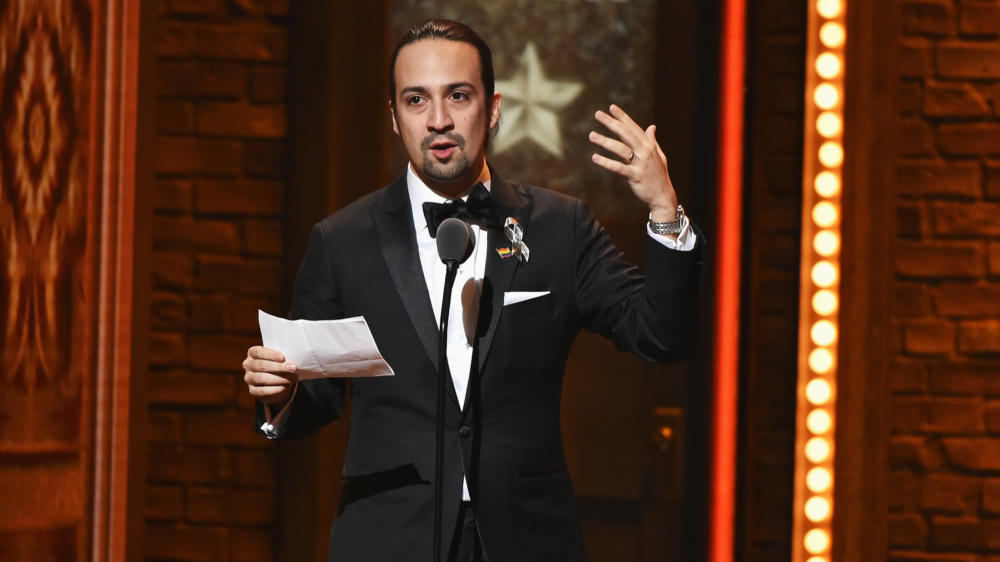My wife’s the reason anything gets done
She nudges me towards promise, by degrees
She is the perfect symphony of one
Our son is her most beautiful reprise
We chase the melodies that seem to find us
Until they’re finished songs, and start to play
When senseless acts of tragedy remind us
That nothing here is promised, not one day
This show is proof that history remembers
We live through times when hate and fear seem stronger
We rise and fall and light from dying embers
Remembrances that hope and love last longer
And love is love is love is love is love is love is love is love
Cannot be killed or swept aside
I sing Vanessa’s symphony, Eliza tells her story
Now fill the world with music, love and pride
Thank you so much for this.
— Lin-Manuel Miranda, accepting the best score Tony for Hamilton last night.
(For the record, if you’re scoring at home, that “And love is love is love … ” line is when I, and the people with whom I was watching the broadcast, lost it completely.)
Yesterday was a day of horror and grief and mourning, and you’d think the last thing on the nation’s mind on such a terrible day would be “Let’s tune into CBS to see people in suits and nice dresses congratulate one another for three hours.”
You’d think. But the Tonys are different. (Here’s the full rundown of last night’s winners.)
The Oscars are about individual achievement, the exaltation of self, the sanctimonious deification of “dreams spun of shadow and light.” The Emmys are about people thanking their managers and network executives. The Grammys are about glamour, or at least glitz. The Golden Globes are about seeing which celebrities can hold their booze.
But the Tonys are, and have always been, about community: a small, fiercely determined and hopelessly devoted cohort of show people and those who love them, a safe haven for anyone who has ever felt like an outsider.
Or, as Tonys host James Corden put it, acknowledging the mass shooting in Orlando with a direct address to the camera at the top of the broadcast: “Your tragedy is our tragedy. Theater is a place where every race, creed, sexuality and gender is equal, is embraced, and is loved. Hate will never win. Together we have to make sure of that. Tonight’s show stands as a symbol and a celebration of that principle.”
It was awkward but sincere. In that sense it was very like every theater kid who has ever lip-synced to My Fair Lady‘s “Wouldn’t It be Loverly” in his darkened bedroom. Said kid was the ostensible subject of Corden’s “That Could Be Me” opening number, which sent him caroming through a gleeful mashup of Broadway hits, from Les Miserables to Phantom to Lion King to Grease to Sweeney Todd to Jesus Christ Superstar to Sound of Music to Music Man to … you get the idea.
“To the theater kids from anyplace with stardust in their eyes,” Corden sang, joined onstage by the actor and actress nominees for best performance in a musical, “of every color, class and race and face and shape and size. To the boys and girls and transgenders, too. To every Broadway would-be. Why wonder if this could be you? It absolutely could be.”
What followed was what most predicted: a Hamilton blowout. The show/cultural phenomenon took home 11 of the 16 Tonys for which it was nominated, including best musical. It didn’t break the 12-Tony record set by The Producers in 2001, but few expected it to, given that several members of its cast were up for the same awards. Writer/star Lin-Manuel Miranda won for both score and book, but lost best actor in a musical to castmate Leslie Odom Jr.
As it always does, the Tonys broadcast served as a three-hour recruitment ad for a life of jazz hands and dance belts. There were good jokes (Corden’s shout-out to the Law and Order franchise, which for years has supplied the New York theater community with bit parts and steady paychecks) and earnest singing (Carmen Cusack sang the spirited, stripped-down bluegrass opening number from the Steve Martin/Edie Brickell show Bright Star). There was the requisite color and splash (a number from the Gloria Estefan jukebox musical On Your Feet featured Estefan herself), and there was good-natured humor (Josh Groban introduced a number from the revival of Fiddler on the Roof by sheepishly acknowledging a grainy video of himself starring as Tevye in a high school production of the show).
Less successful were segments featuring the casts from various shows stepping outside the Beacon Theater to perform before a waiting crowd. Done in homage to the Hamilton cast’s beloved #Ham4Ham practice of performing for those waiting for the ticket lottery, the broadcast’s emulation seemed merely dutiful, as the performers delivered only a single verse from Broadway classics before sending viewers to commercials.
As host, Corden was genial and charming. If he lacked the sardonic edge that Neil Patrick Harris brought to the job in the past, it wasn’t missed. No, what was needed yesterday was something more full-throated and uncomplicated. Something simpler and more joyful.
And that something was brought, not by Corden, but by Cynthia Erivo, who stars as Celie in an acclaimed revival of The Color Purple. She won best actress in a musical, and blew the roof off the Beacon Theatre with a performance that concluded with her standing center stage, belting a song of grace and gratitude and, yes, pride, on a day when its message desperately needed to be heard by an audience filled with grieving men and women and Broadway would-bes:
But most of all
I’m thankful for
Loving who I really am
I’m beautiful
Yes I’m beautiful
And I’m here
9(MDA3MTA1NDEyMDEyOTkyNTU3NzQ2ZGYwZg004))
